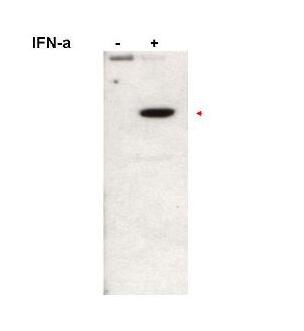STAT2 Rabbit Polyclonal Antibody
Other products for "STAT2"
Specifications
| Product Data | |
| Applications | IHC, WB |
| Recommended Dilution | ELISA: 1:85,000; Western Blot: 1:500–1:1000; Immunohistochemistry: 1:100 |
| Reactivities | Human, Chimpanzee, Macaque, Vervet Monkey, Rat, Dog, Pig, Horse, Mouse, Bovine |
| Host | Rabbit |
| Isotype | IgG |
| Clonality | Polyclonal |
| Immunogen | This affinity purified antibody was prepared from whole rabbit serum produced by repeated immunizations with a synthetic peptide corresponding to a region near the N-terminus of human STAT2 protein. |
| Formulation | 0.02 M Potassium Phosphate, 0.15 M Sodium Chloride, pH 7.2 |
| Concentration | lot specific |
| Conjugation | Unconjugated |
| Storage | Store at -20°C as received. |
| Stability | Stable for 12 months from date of receipt. |
| Gene Name | signal transducer and activator of transcription 2 |
| Database Link | |
| Synonyms | IMD44; ISGF-3; P113; STAT113 |
| Note | This antibody is suitable for Cancer, Immunology and Nuclear Signaling research. STAT2 is a member of the STAT family of transcription factors. Unlike other STATs, STAT2 is unique as it can only be activated by interferons (IFNs). STAT2 is a critical component in mediating many IFN-stimulated biological activities including antiproliferation and antiviral responses. Upon IFN treatment, STAT1 and STAT2 become tyrosine phosphorylated, assemble as heterodimers that bind IRF9 to form the ISGF3 complex. This complex translocates to the nucleus, binds to promoters of IFN-stimulated genes and mediates gene transcription. Consequently, mutations in STAT2 or loss of STAT2 expression leads to impairment in IFN signal transduction and gene activation. IFN-alpha is an approved drug for the treatment of several forms of cancer. Yet only a subset of patients who receive IFN-alpha therapy benefit from the treatment. Given that STAT2 is activated by IFNs, it is important to define if the reduced or lack of antitumor effects seen in cancer patients on IFN therapy is due to in defects in STAT2 function. Our goal is to identify regions/motifs within the structural domains of STAT2 that not only are essential for the tyrosine phosphorylation of STAT2, but also regulate the antitumor effects of IFN-alpha. Collectively, the results of our studies will emphasize the physiological role of STAT2 in cancer. From a clinical viewpoint, cancer patients who may benefit the most from receiving IFN-alpha therapy can be selected based on their STAT2 function. |
| Reference Data | |
| Protein Families | Druggable Genome, Transcription Factors |
| Protein Pathways | Chemokine signaling pathway, Jak-STAT signaling pathway |
Documents
| Product Manuals |
| FAQs |
{0} Product Review(s)
0 Product Review(s)
Submit review
Be the first one to submit a review
Product Citations
*Delivery time may vary from web posted schedule. Occasional delays may occur due to unforeseen
complexities in the preparation of your product. International customers may expect an additional 1-2 weeks
in shipping.






























































































































































































































































 Germany
Germany
 Japan
Japan
 United Kingdom
United Kingdom
 China
China




